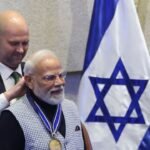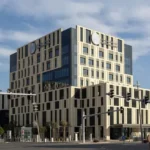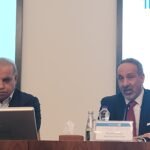Kuwait, 01 Dec. 2024 (QNA)
The Amir of State of Qatar, Sheikh Tamim bin Hamad Al-Thani took part along with leaders of Gulf Cooperation Council and heads of delegations in 45th session of GCC Supreme Council, held Sunday at Liberation Hall in Bayan Palace in Kuwait.
Among Qatar delegation included Prime Minister and Minister of Foreign Affairs, Sheikh Mohammed bin Abdulrahman bin Jassim Al-Thani and members of the official delegation accompanying the Amir, along with rulers, their delegations and the summit guests.
Amir of Qatar, Sheikh Tamim bin Hamad Al-Thani said the meetings of the 45th Session of the Supreme Council of the Gulf Cooperation Council (GCC) on Sunday in Kuwait deliberated issues to boost joint Gulf cooperation across all fields. He posted on X that today's important consultations within the 45th Summit hosted by the sisterly State of Kuwait facilitated deliberations on several issues to foster joint GCC cooperation across all areas.
During its presidency of the previous session, the State of Qatar - in collaboration with its sisterly countries - took important steps in the joint action path to deepen fraternal relations and achieve a better future for Gulf societies, Amir of Qatar added.
He congratulated Sheikh Mishal Al-Ahmad Al-Jaber Al-Sabah on Kuwait's presidency of the current session of the Council, wishing his sisterly country success in expanding the horizons of the path of joint Gulf action.
The regular Gulf summits increase cohesion among GCC peoples, said Deputy Prime Minister for the Council of Ministers in the Sultanate of Oman Sayyid Fahd bin Mahmoud Al Said.
Addressing the 45th session of the Supreme Council of the Gulf Cooperation Council in the State of Kuwait on Sunday, Al Said added that holding GCC summits regularly enhances the Council's global position and its ability to address common challenges and to achieve further progress and prosperity for its member states.
He affirmed the Sultanate of Oman's determination to continue joint efforts in all areas of cooperation to consolidate security and stability in the region and handle current issues.
Formation of GCC
(Kuwait Times)
In December 1978, Sheikh Jaber Al-Ahmad, then Amir of Kuwait instructed the late Crown Prince and then Prime Minister, Sheikh Saad Al-Abdullah Al-Salem Al-Sabah, to visit the five other Gulf countries — UAE, Bahrain, Saudi Arabia, Oman, and Qatar — to present his proposal. His visits were met with strong support, and the subsequent official statements emphasized the need for rapid action to unite these nations. They highlighted the deep religious, cultural, and national ties between the Gulf countries, which provided a solid foundation for cooperation and progress, as well as a means to counter the growing influence of external powers in the region.
At the 11th Arab League Summit in Amman in November 1980, Sheikh Jaber Al-Ahmad presented a Kuwaiti vision for a unified Gulf strategy. His proposal called for a comprehensive framework of cooperation, encompassing political, economic, cultural, and military collaboration. This vision was widely embraced by the Gulf states.
On February 4, 1981, the foreign ministers of the six Gulf states convened and issued a statement calling for the establishment of the GCC, emphasizing cooperation among member states rather than a political union. To implement this vision, a committee of experts met in Riyadh on February 24-25, 1981, to finalize the council’s structure and draft its founding charter.
On March 9, 1981, the foreign ministers met in Muscat, Oman, where they approved the GCC’s organizational structure and initialed its founding charter. Finally, on May 25, 1981, the first summit of the GCC was held in Abu Dhabi, officially establishing the Gulf Cooperation Council. The founding charter was formally adopted, and Kuwaiti diplomat Abdullah Yacoub Bishara was appointed as the first Secretary-General of the GCC.
Founding Charter
The preamble of the GCC’s charter underscored the special relations, shared values, and common objectives among the member states, all rooted in Islamic principles, a common destiny, and unity of purpose. The GCC’s cooperative efforts were aimed at serving the higher goals of the Arab nation.
The objectives outlined in the founding charter include promoting coordination, integration, and unity among the member states across a range of fields—political, economic, financial, commercial, customs, transportation, education, culture, health, media, tourism, and legislative affairs. The charter also emphasized fostering scientific and technological advancements in key sectors such as industry, mining, agriculture, water, and animal resources, while establishing research centers and joint projects to encourage private sector cooperation.
The final communiqué of the first GCC summit highlighted the region’s security and stability, emphasizing the rejection of foreign interference and the need for the Gulf to remain free from international conflicts.
Kuwait Declaration, 01 Dec. 2024 (WAM-UAE News Agency)
The GCC leaders and representatives affirmed their strong support for the Palestinian cause, emphasising the importance of Palestinian sovereignty over all lands occupied since June 1967, and the establishment of an independent Palestinian state with East Jerusalem as its capital.
In the Kuwaiti Declaration, issued at end of the 45th GCC Summit, held in Kuwait on December 1, the leaders praised the increasing role of GCC countries in addressing political and economic challenges, both regionally and globally.
They also commended their contributions to resolving issues that threaten peace, security, and stability, while promoting international dialogue and fostering connections among nations. The leaders called for further efforts to strengthen the region's global position as a hub for business and economy, promote sustainable economic diversification, advance digital transformation, stabilise energy markets, and effectively address climate change. They condemned Israel's ongoing military actions in Gaza, Lebanon, and the West Bank, as well as violations in occupied Jerusalem's holy sites, calling for an immediate end to violence, urging international intervention to protect civilians and support negotiations for peace.
The declaration highlighted the increasing role of GCC countries in addressing political and economic challenges, both regionally and globally, as well as acknowledged their contributions to resolving issues threatening peace, stability, and security, and to promoting international dialogue.
The summit expressed support for the outcomes of the extraordinary Arab-Islamic summit held in Saudi Arabia on November 11, 2024, which sought to halt the war in Gaza and advance the two-state solution. The leaders also praised Qatar's efforts to mediate a ceasefire and facilitate detainee exchanges.
Regarding Lebanon, the GCC leaders condemned Israeli aggression and warned of its potential to escalate into a broader regional conflict. They welcomed the temporary ceasefire agreement in Lebanon and called for Israel occupation's withdrawal, the implementation of
UN Security Council Resolution 1701, and the return of displaced persons.
They also expressed solidarity with the Lebanese people and called for a political solution to Lebanon's internal divisions, emphasizing the country‘s role in Arab security and culture.
In Yemen, the GCC leaders commended the efforts of Saudi Arabia and Oman to revive the political process among Yemeni parties.
The leaders reiterated the GCC's commitment to peaceful diplomacy in resolving regional and global disputes, respecting state sovereignty, and adhering to international law. They praised the GCC's growing influence in addressing regional and global challenges, promoting international dialogue, and building strategic partnerships. They emphasised the need for ongoing implementation of summit decisions to maximise their practical benefits. The leaders of the GCC countries emphasised the need to intensify efforts to strengthen the region's role as a global hub for business and economic activity.
They also underscored the importance of sustainable economic diversification, energy market stability, and effective responses to climate change. They reaffirmed their commitment to empowering Gulf women across various fields and enhancing the role of youth.
The leaders highlighted the importance of universities, research institutions in preserving Gulf identity, Arab culture, Islamic values, and principles of good leadership, emphasising the role of GCC institutions in achieving these objectives.
They recognised the digital economy as an opportunity for economic growth and regional integration, commending the region's advanced and adaptable digital infrastructure, including investments in fast communication technologies. These investments have positioned the GCC as a global hub for the digital economy, encourage innovation, supporting emerging technologies, and attracting digital investments.
The leaders highlighted the importance of strategic investments in areas including artificial intelligence (AI) and cybersecurity. These technologies, they noted, have placed the GCC in a leading position to capitalise on
the global digital transformation, with applications in renewable energy, healthcare, education, transportation, and financial services.
The leaders also called for enhanced cooperation among GCC countries to develop joint digital strategies, facilitate e-commerce, advance digital payment systems, and strengthen cybersecurity. They emphasised the need to establish unified digital markets to boost regional economic integration and global competitiveness. Recognising their diverse resources, skilled workforce, and advanced technologies, the leaders noted the growing contribution of GCC countries to the global economy. They emphasised that the region's digital initiatives aim not only to achieve national objectives but also to drive global innovation and economic growth, solidifying the GCC's status as a key player in the digital economy.
The leaders stressed the ongoing development of digital infrastructure and the adoption of emerging technologies, alongside building a technically skilled workforce capable of leading the digital transformation.
They underscored the importance of balancing innovation and economic growth with environmental and social sustainability.
The leaders affirmed that these collective efforts demonstrate the GCC's commitment to keeping up with global advancements, improving citizen's quality of life, and establishing the region as a global digital economy hub, ensuring sustainable prosperity for both the region and the world.











